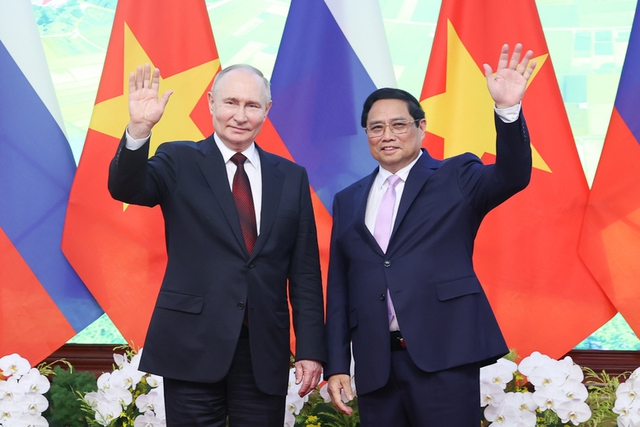Prime Minister Pham Minh Chinh meets President Putin
VGP - Vietnamese Prime Minister Pham Minh Chinh met with Russian President Vladimir Putin in Ha Noi on June 20 on the occasion of the latter’s state visit to Viet Nam.

Vietnamese Prime Minister Pham Minh Chinh (R) and Russian President Vladimir Putin at the Government Office in Ha Noi, June 20, 2024 - Photo: VGP/Nhat Bac
Prime Minister Pham hailed President Putin's state visit which coincides with the 30th anniversary of the signing of the Treaty on Fundamental Principles of Friendly Relations between Viet Nam and Russia (June 16, 1994-2024).
The two sides agreed to promote economic cooperation as an important pillar in the Viet Nam-Russia comprehensive strategic partnership.
They were unanimous in improving the effectiveness of bilateral cooperation mechanisms, particularly the Inter-Governmental Committee for Economic-Commercial and Scientific-Technical Cooperation; promptly developing a comprehensive plan for Viet Nam-Russia cooperation until 2030 and the list of prioritized tasks for 2024-2025, and strengthening financial and credit cooperation to facilitate trade and investment.
Prime Minister Pham suggested the two sides fully optimize the advantages of the Eurasian Economic Union-Viet Nam Free Trade Agreement.
He took the occasion to call upon Russia to continue removing trade barriers to facilitate bilateral trade, particularly the export of Vietnamese consumer goods and agricultural products to Russia.
He also called for increasing the quota for Viet Nam’s rice exports and supporting access for Russian agricultural products to the Vietnamese market.
As oil and gas cooperation represents a cornerstone of the bilateral economic cooperation, Pham suggested the two sides work closely together to timely tackle difficulties and improve the efficiency of joint projects in oil exploration and exploitation.
Viet Nam stands ready to back operations of the joint venture Vietsovpetro and Russian oil companies like Zarubezhneft and Gazprom in expanding their activities in Viet Nam, Pham said.
He also recommended both sides kick-start negotiations and sign a new agreement on labor and vocational training.
Prime Minister Pham suggested Russian leaders and authorities continue supporting the overseas Vietnamese community in Russia.
Regarding global and regional issues of shared concern, the two leaders promised to continue working closely together at multilateral forums, including the UN, ASEAN and APEC.
President Putin acknowledged Viet Nam's objective and balanced stance on the Ukraine issue.
Prime Minister Pham said that Viet Nam supports the settlement of disputes and differences via peaceful measures in accordance with international law and the United Nations Charter, taking into account the legitimate interests of all parties involved, for the sake of peace, stability and development in the region and the world.
Viet Nam is ready to join international efforts to seek peaceful and sustainable solutions to the Ukraine issue, said Pham.
Regarding the East Sea issue, both sides expressed their support for the settlement of disputes through peaceful means in line with international law and the UN Charter, particularly the 1982 UN Convention on the Law of the Sea (UNCLOS); ensuring security, safety, and freedom of navigation and aviation; full enforcement of the Declaration on the Conduct of Parties in the East Sea (DOC) and soon achieving an effective and practical Code of Conduct (COC) in the East Sea./.

